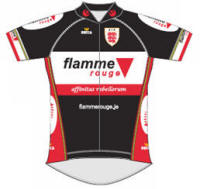January ~ Keeping Healthy
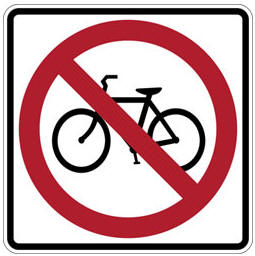 As we enter the crucial
phase of our winter training programme we become more susceptible to picking up
coughs, sniffles, sore throats and other contagious infections from
contaminated others.
As we enter the crucial
phase of our winter training programme we become more susceptible to picking up
coughs, sniffles, sore throats and other contagious infections from
contaminated others.
Or as some would call them, family and work mates!
There are, however, a few easy defence strategies we could be deploying to make sure we stay healthy and keep our training and riding on track.
This factsheet will hopefully explain the obvious, and not so obvious, options that may help minimise your risk of infection.
The closer you stick to them the more chance they can help keep you riding as winter draws to a close and we enter the critical spring, speed-based, high-intensity, training phase.

Mick Heald ~ flamme
rouge road captain
in a mildly (Cascades induced) stressed state!
The
Obvious Warning
If you train hard (a
stressor), in mixed company (an infection risk), while in a (hopefully)
mild fatigued state (another
stressor), without adequate hydration (another infection risk), sooner or
later you will, to some extent or other, expose yourself to an infection
risk.
Re-read the statement above and make it stick in your mind. You are absolutely in the "at risk" group.
We are all training hard for the forthcoming season and the very nature of our training will leave us somewhat fatigued. We never seem to have enough drink on board to get us through those four or five hour rides, so we "ration" it. And to keep us sane, we ride with our mates.
But it needn't be a foregone conclusion that we're going to get taken out by a bug and be out of action only to lose our previously hard earned fitness gains.
How do you
get an infection?
For the sake of this factsheet we'll
assume the two most relevant options and ignore all other innuendos!
 One way of becoming infected
is through exposure to higher than normal rates of germs and bacteria;
children (sick ones), office workers (all of them), air conditioning, public
transport, shopping centres, cinemas, ATM machines at banks, cafe stops etc, etc.
One way of becoming infected
is through exposure to higher than normal rates of germs and bacteria;
children (sick ones), office workers (all of them), air conditioning, public
transport, shopping centres, cinemas, ATM machines at banks, cafe stops etc, etc.
All the above increase your exposure to potential training interruptions.
Another infection route is through our own natural defences becoming lower than normal and working at less than their optimal level.
This allows normal risk exposures levels to have an affect where previously you, or your immune system, would have bravely fought them off.
Obviously a combination of the two gives us a double whammy. Having lower defences than normal and sitting in an office full of coughing, sneezing, dribbling colleagues is a "common-cold" waiting to happen.
We breath in what they breath out, an upper respiratory tract infection (URTI) is normally our starter for ten.
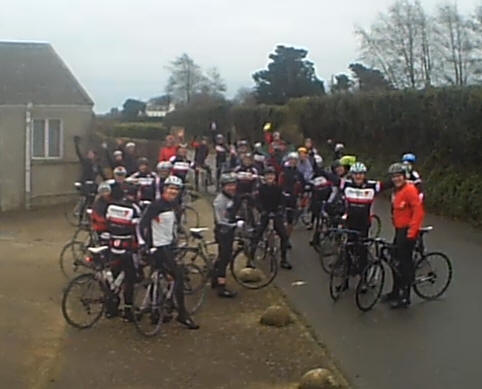
Training doesn't get much harder than a cold, wet, windswept Climbageddon
Training & Immune Suppression
When we train, our body becomes slightly run down. When we train
hard, it becomes more run down. And when we train very hard, our
defences are run down to such an extent that an "infection window of
opportunity" can be opened for anything from three to seventy-two hours.
If we're undertaking two or three heavy sessions a week (and who isn't at this time of year) our body rarely has time to close this infection window and minimise the infection threat from the great unwashed.
We have to be fully on our game if we want to dodge all the bullets. There is an element of luck, but (cliché alert) you make your own luck and can control your own destiny.
Training a little builds our immune system. Training quite a bit strengthens it significantly. Training really hard weakens it considerably. And over-training, totally wrecks it, with obvious and catastrophic results.
The diagrammatic representation below shows the classic J curve with training intensity mapped against risk of infection.
It shows there is a cross over point at which we become more, but not exclusively, susceptible to URTI infections.
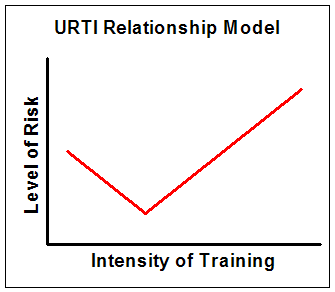
Sedentary individuals (left of chart) have a medium risk of incurring an infection because their defences are low due to lack of metabolic action.
Mild exercise (middle) primes the defences and offers a lower risk of contracting an infection as defences are "woken from their slumber".
Moderate to heavy exercise (mid-right) draws on the body's resources which reduces immune levels and produces a similar risk exposure as our couch-potato cousins.
And heavy to extreme exercise (far-right) gives the body such a hammering that fewer resources are available to fight infection should one be contracted; we're at maximum risk.
Evidence Based Evidence!
Documentary Olympic evidence
shows that 13% of Marathon participants suffered URTI in the week after
completing their target event.
In a parallel control group that had the same pre-event training programme, but didn't compete the event itself, only 2% of the group contracted an infection.
Training hard causes us to breath through our mouth, which dries it out. We also spend an inordinate amount of time, when riding in the winter, removing blockages from our nose and throat.
The mucus and saliva in our nose and mouth are our infection protection systems. During our long winter rides we spend most of our time destroying or expelling these protective systems. Is it any wonder we become susceptible to infections?
Minimising
the Risks
There are
simple choices we can make to help
our body defend itself from the winter onslaught. Here are some of
them.
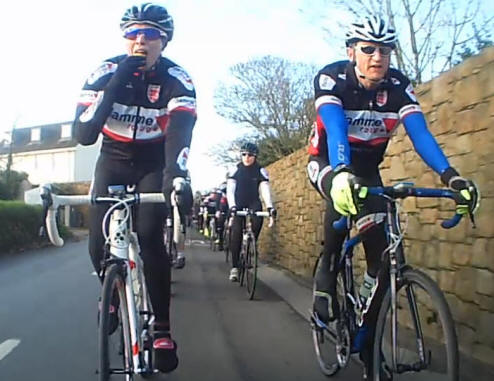
eat and drink, little and often
Food & Nutrition
No one likes their food more than a cyclist but quantity isn't
everything. Eating a healthy and balanced diet will help our body
prepare its defences more appropriately.

High carbohydrate diets are great for training purposes but, if we're not careful, our diet may lack the nutrients, minerals and vitamins we need to keep us healthy.
Increase protein intake, raise vitamin C intake and eat plenty of fruit. Keep topped up on the rides, don't get hungry and don't risk the bonk. See the Digestive Process factsheet for more info.
Recover
The cumulative physical stress of repeated hard training sessions
will slowly nibble away at our immune suppression systems. Without proper scheduled
recovery we also increase our level of stress hormones which
just adds to the pressure on our body to fight off infection. A
battle it will ultimately lose.
Structure your training and structure your recovery; especially if you're a veteran or new to the sport. Here's our classic three on, one off structure. The most important week here is the grey one...

There are now loads of recovery drinks, bars and supplements on the market. They're not all a waste of money. Find one that works and use it, even if it's only during the high infection risk periods of January and February. And always on a training camp!
Clothing
Our clothing can harbour all sorts of germs, bacteria and risks.
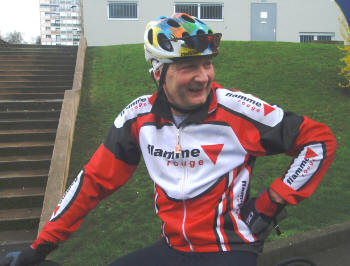
Don't get in from a long ride on Saturday then place your gloves on the radiator, ready to be nice and warm for your Sunday ride.
The germs and nasal bacteria left over from your ride will sit, incubate and multiply a squillion times overnight.
Don't get up in the morning, still recovering from the day before then go out, get hot, get sweaty and wipe your nose or eyes on the gloves with yesterday's "stuff" still on them! Get them washed and stay healthy.
The cost of buying a second pair of gloves is insignificant to the financial cost of days off work and physical lost opportunities on your training programme.
Shorts are another area of potential infection. It's really easy to "save" Saturday's pair for Sunday. We've all (through fatigue or laziness) done it at some time or another; don't. It's not worth it and with today's quick drying materials, not necessary.
It's the same with bottles. Don't leave them on the bike Saturday and top them up on Sunday. Take them off, rinse them out with boiling water, and put the tops in the dishwasher.
Once a month clean the insides with Milton baby bottle cleaning stuff.
You may get away without doing all this on the odd time you may forget, but you won't in the winter. Especially if it's a regular routine.
One day you'll get caught and get caught bad. It's bad enough fighting off everyone else's bacteria and germs without adding to the problem by creating your own.

Mick Heald ~ this time after a Climbageddon Ride...
Sleep
We all need sleep; it's part of the
body's restorative and rebuilding
process. Loads of physiological things happen when you sleep which
we won't go in to just now; but if you want to train well and stay
healthy you need your sleep.
Everyone is different so we're not going to be prescriptive and say you need 8 hours a night. Be aware of your training and the demands you put on your body. Ensure adequate rest and recovery and give your body the sleep it deserves.
If you wake up to go and do your big weekend ride, really, really tired, go back to sleep for an hour and go out an hour later. Your training session will be of a higher quality and it'll pay dividends in the long run.
Just make sure you make it past the back door before you set settled.
Hydration
As we said earlier, the mucus
in your nose and the saliva in your mouth are your body's defence
mechanism against infection. Training in cold weather while
breathing heavily will quickly dry out these defences and increase your
susceptibility to infection.
Drink little and drink often to preserve fluid levels; not all of it goes to your muscles.
Cafe Stops
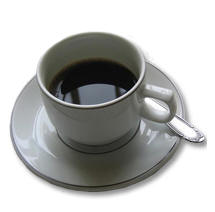
You
are most vulnerable to URTI infections within the first hours of
finishing your exercise.
Which is why a cafe stop is never, ever, ever, a good idea in the depths of winter. Ever!
Sitting in a crowded room when you're hot and sweaty, with people you don't know, touching hard surfaces with goodness knows what on them, then putting damp clothes on to ride home in the cold, is a risk you could easily eliminate.
Before you got there, a couple of hundred coughing, sputtering, germ-incubating ne'er do wells have touched the backs of chairs, the door handles, the counter top and everything else you're going to touch.
It only takes one of those people to have a cold, or not to of washed their hands after a toilet visit, to leave a germ behind, for you to pick up in your immune-suppressed state, and there you are; got!
I know cafe stops are a big part of the cycling social scene, but there is a consequence for every decision you take. It's all a matter of choice. I choose not to! Anyway, by the time I get there all the good cakes have gone!
Supplements
If
you look after yourself in the ways mentioned above you should be alright. However, if you are in a riskier environment than most (a bus conductor
(we do have one on our books)) then it's better to be safe
than sorry. You can't be too cautious, even if it's just for these six,
high risk,
weeks of the year.
Echinacea is a supplement a lot of people take as a preventative option. If you're in an office full of sneezing machines or sit near an air conditioning vent then this could be a more endearing option to your workmates than a face mask!
Vitamin C is another favourite. Obviously getting it from fruit sources is better than a tablet but sometimes nature needs a helping hand. Vitamin C also helps the absorption of iron from your diet; which is a good thing.
Neovite has been reported as helping but it's expensive. Pumpkin seeds are an age old remedy, which are cheap. They're full of Vitamin B which helps in the production of antibodies.
Vitamin E is also regarded as a "muscle-damage" limiter that may aid recovery during bouts of heavy training. The quicker you recover the less the "window of infection opportunity" is open, the healthier you will stay.
If you really want to give your body a fighting chance, lay off the caffeine and alcohol. Save it for race day. The caffeine, not the alcohol!
Personal
Hygiene
Virus infections can be transmitted by air but are more commonly caught
by touch. The most important thing you can do to stay healthy is
to make sure you wash your hands thoroughly four or five
times a day when at work. You may be more susceptible and at risk
than you think.

If someone coughs, and politely puts their hand over their mouth, you may be protected. But when they shake your hand to leave? Without precautions you're over half way to your sick bed.
When they leave, the first thing you do is wash your hands or use an anti-bacterial gel. Don't touch your face, eyes or mouth.
Suppose someone sneezes in to their hanky, then puts it in their pocket and leaves your office. You might escape infection. If, however, you leave the room just after them and open the same door they've just closed, what was previously on their hand is now on your door handle.
Having opened it, it also now on your hand, the same as with our coughing friend. It only takes a wipe of your eye or a touch of your mouth and you're caught.
The same obviously goes for lifts (elevators); everyone will think you're strange, but push the buttons with the thumb knuckle of your non-natural hand. Left-hand thumb for me.
My non-exercising friends think I'm too obsessive about this stuff. But they haven't spent the last three months busting a gut every Saturday and Sunday to get fit.
A cold to them is an excuse for a couple of days off work. To us? It's not the end of the world but it can sure feel like it sometimes.

sometimes you've gust gotta suck it up...
The Message
So there we are, a few hints and tips to help you stay healthy. Not an exhaustive list I grant you but some key common sense pointers
that cover the major reasons for catching colds and over the last few years
something even worse.
Getting ill now could disrupt your early season preparation which isn't good. But it's the same for everyone, so don't beat yourself up about it. It's just your turn if you do get it; 99% will.
Some may be tempted to "train-through" any illness or virus in attempt not to lose any hard gained fitness, that's bad, very bad.
Heavy training while suffering any illness will seriously disrupt your WHOLE season. Lose a week now or lose three months later? Not a difficult decision is it? Here's a FAQsheet on when to come back from illness.
Stay away from sick people, wash your hands, bottles and clothes as often as possible, eat and drink well, take supplements if you feel especially vulnerable and give the cafe stop a miss until the "cold season" is over.
Healthy riding, see you all next month..

